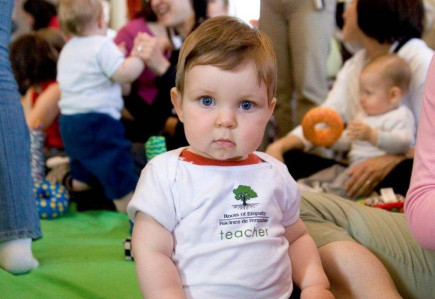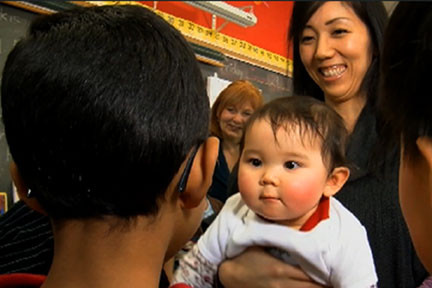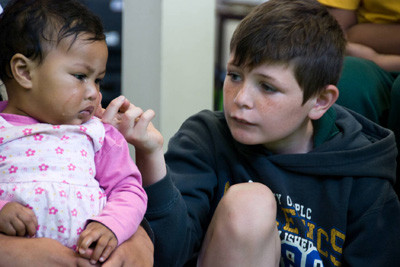This month, we feature videos of a Greater Good presentation by Mary Gordon, the founder of Roots of Empathy, a world-renowned program that brings babies into classrooms to help teach emotional literacy. In this excerpt from her talk, Ms. Gordon describes the inspiration for her program and shares moving stories of its success.
For years I worked with families who were very abusive to their children. Over time, I came to realize that all of the suffering that the children collected—whether it was domestic violence or child abuse or neglect—was a result of the absence of empathy in the parent.
 © Roots of Empathy
© Roots of Empathy
There wasn’t one of those parents who woke up and decided, “Today is the day I’m going to hurt my child.” These were not monsters; these were people who I loved, actually.
I remember working with a group of teenage mothers who had all lived through sexual or physical abuse as children and were now struggling with addiction. They had great difficulty empathizing with their children. When the children would fall down, the mothers would say, “No pain, no gain.” And this could be a little toddler learning how to walk.
I saw that if you haven’t experienced love, it’s very difficult to know how to love.
So what can we do to break this cycle of abuse and neglect?
My idea was to focus on the attachment relationship between parent and child. I believe that we inherit the capacity for empathy—that we are all intuitively empathic—but this capacity can wither on the vine if a child never experiences empathy in the attachment relationship with their parents. So why not learn from the attachment relationship?
That idea motivated me to launch Roots of Empathy in 1996. Roots of Empathy is a classroom-based program for children in kindergarten through grade eight. Our mission is to build more caring, peaceful, and civil societies by raising levels of empathy in children.
Really the heart of the program is bringing the attachment relationship into the classroom: Every month for nine months, we bring an infant into the classroom with its parents, accompanied by a Roots of Empathy instructor. Children watch love grow over a whole school year; they watch confidence and security and emotional attunement between parent and child grow as well.
In addition to the family visits, the Roots of Empathy instructor visits the classroom days before the family visit, to help the children prepare for it, and days after the family visit, to help the children reflect on it, for a total of 27 Roots of Empathy visits over the year.
Through these visits we teach emotional literacy. Every time the baby demonstrates some emotion, the children talk about the baby’s intention and what the baby must be feeling. They are learning the language for their feelings.
I remember once when we had children in a fourth grade class talking about a time when they felt sad; we were helping them understand that we all feel sad and lonely at times, but we can help one another. And this little girl, out of the blue, said, “I felt sad when my mommy gave me away because we didn’t afford good food.”
Nobody said anything at the time. But the next day, most of the children in the class came with food. The majority of the children quietly in the cloakroom gave the food to the little girl. But what was so poignant was how some of the children said, “This is for your mommy, so your mommy can get you back.”
Clearly we’ve not begun to plumb the depths of the human heart, and I think it beats most deeply in our children. Very often little children are more emotionally literate than we are.
 © Roots of Empathy
© Roots of Empathy
I think we in North America are emotionally illiterate. We worry about our traditional literacy rates, but we should be more worried, I think, about our emotional literacy, our ability to connect to ourselves and one another. In schools, we teach children to read, but if we don’t teach them to relate to others, they will be lost in life—lost in their relationships, they will not have success in their jobs, and we will not have peace in the world. It’s our mountains and our continents and our oceans that divide us. But it is our similarities through our emotions that connect us.
In Roots of Empathy, children can see their similarities to others through the baby. When children observe every dimension of “their” baby—every hiccup, every smile, every anxious glance—they learn about the baby’s temperament traits.
For example, is the baby high intensity or low intensity, and what does that mean? The baby cries frequently, loudly, and long—that’s an intense baby. This helps the children to understand themselves and gives them permission to love themselves if they are intense, because we all agree we love the baby, whether the baby is high intensity or low intensity.
“Oh I think you’re very intense, Billy,” one child said to another after a visit from their baby.
“Why do you think I’m very intense?” asked Billy.
“Because you have meltdowns all the time.”
“Yes,” said Billy, “so I’m like our baby! Pretty cool!”
Another thing we do in Roots of Empathy is keep an emotion barometer, where the children say whether they’re feeling great, not so great, or in the middle. Then we look at the whole list and ask the children what they observe. Nobody particularly notices who said what, but they’re astounded if they are one of the children who isn’t feeling too happy that day and they see there are other people who aren’t happy. There’s such isolation in our negative feelings: It’s easy to be happy together, but it’s hard for a child to talk about being lonely and scared.
And the lovely thing that happens when children have insights into how another person feels—empathy—is that it provides a break against aggression.
Sure enough, we know from independent research on Roots of Empathy that its greatest effect is in decreasing aggression among children—a hugely important result, because aggression is the gateway to all other kinds of bad outcomes for children. Many people have applauded the program for combating bullying. I had never intended for it to be an anti-bullying program; it was a happy accident that it did reduce all kinds of bullying.
The research also suggests we are improving children’s emotional literacy. When compared with other students, Roots of Empathy students demonstrate significantly better understanding of their own and others’ emotions.
What’s more, the research shows that Roots of Empathy creates more caring and supportive children—they’re kinder, more likely to share and help their classmates. They also feel more supported by their classmate and teacher, and they feel a greater sense of autonomy than other children do.
Amazingly, students at every grade level continue to show these improvements in their behavior three years after completing Roots of Empathy.
Children in Roots of Empathy also have much more knowledge than other children about parenting and the needs of babies. So many parents with whom I used to work shook their babies to paralysis, deafness, blindness, or death simply because they didn’t understand that babies cry because of their emotional needs, not just their physical needs—they could be crying just because they wanted to be held. If children really can understand the emotional life of a baby, they can parent beautifully as adults.
After starting as a pilot program with 150 children in Toronto 15 years ago, Roots of Empathy has now spread across Canada and across the world. This past school year, more than 47,000 children participated in Canada, in about 1,900 classrooms and 1,300 schools. In the fall of 2011, every Canadian province will be taking part in the program. It is delivered in English and French and reaches rural, urban, and remote communities, including Aboriginal communities in Canada. To date, Roots of Empathy has reached more than 363,000 children across the country. We have also launched a “sister” program, Seeds of Empathy, for younger children, three to five years of age, in childcare centers.
We also have programs in the United Kingdom, Ireland, Northern Ireland, New Zealand, and Germany. The program is just now taking off in the United States, with a program in Seattle and new ones launching in New York and the San Francisco Bay Area this fall. We are planning to reach other countries soon.
 © Roots of Empathy
© Roots of Empathy
When we pair some of these Roots of Empathy classrooms—when Aboriginal children in northern Ontario communicate with Maori children in New Zealand, for instance—they see how very alike they are. They say exactly the same kinds of things about their babies. They say exactly the same kinds of things about their families. They say exactly the same kinds of things about their friends.
And at the end of the year, when they make wishes for their babies, as all Roots of Empathy classes do at the end of the year, they wish for the same things. And what they wish should be on the policy tables of every country on the planet. They wish that the baby will be happy. They wish that the baby will be healthy. They wish that the baby will always have a good friend. They wish that the baby won’t have asthma—that’s clearly the little children with asthma. They wish that the baby will never be bullied—that’s some child who has suffered. They wish that the baby will have a daddy, and they wish that the mommy won’t have to go to work.
Every classroom has an armada of broken hearts, and poor teachers have such an incredible job. I had one teacher call me up last year. “I didn’t want to have Roots of Empathy,” he said. “I don’t know anything about babies—what did I want a baby in my classroom for? But my principal made me have it.”
“Really, I don’t know what to say to you,” he continued. “But I had intended to retire in June, and now because of Roots of Empathy I’m teaching for two more years to catch up on all those children I didn’t see.”
There’s no child that we should ever give up on. What Roots of Empathy offers is a pedagogy of hope, helping children find their voice—often through art—to share what’s in their heart.
Childhood is a very short season, and we know so much can be done to allow children to lead happy and productive lives. In the folds of a child’s brain, we have the potential for compassion, we have the makings of dreams, and we have without question the hope of tomorrow. Because it’s really on the breath of little children that the moral future of the universe rests.



Comments
it’s the natural behaviar more than wisedome ..
just a point
Asala | 11:22 am, November 3, 2011 | Link
Most of this article I felt detached from, thinking that happens
in other families with other kids. I do remember now that
emotional detachment has affected my toddler, albeit briefly
at the playground. Some boys made a comment about how
annoying toddlers are, like the brother or sister they had at
home.
There are cultures where children look after children and
babies, with pride and sense of responsibility. It gives them a
sense of importance, as they know they are contributing in a
big way for their community. There is no sense of frustration
when the baby or child wants to play at something ‘forever’.
Sandra | 3:06 pm, December 15, 2012 | Link